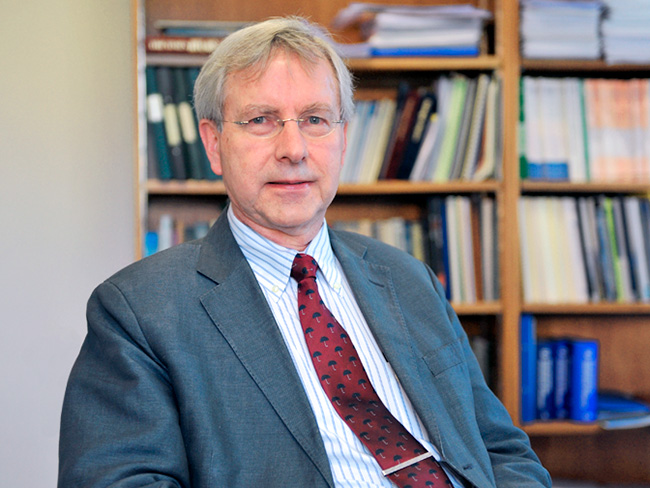

Experts in numerical weather prediction (NWP) will converge on the Centre on 8 June for a symposium on dynamic meteorology to mark the departure of ECMWF’s Director of Research of eight years, Erland Källén.
Professor Källén will resume his position at Stockholm University when he leaves the Centre in July.
Dynamic meteorology is the study of the physics of atmospheric circulation.
It aims to advance our ability to understand and predict the atmosphere based on the laws of physics, mathematics and numerical methods.
The speakers at the symposium will be:
- Raymond T. Pierrehumbert (Halley Professor of Physics at the University of Oxford)
- Nedjeljka Žagar (Professor of Meteorology at the University of Ljubljana)
- Hans Huang (Head of Weather Modelling and Prediction at the Centre for Climate Research Singapore)
- Stephen Belcher (Chief Scientist at the UK Met Office)
- David Burridge (Director of ECMWF 1991–2004)
- Erland Källén (Director of Research at ECMWF)
- Florence Rabier (Director-General of ECMWF)
Raymond Pierrehumbert will speak on multiple equilibria, bifurcations and climate regimes. Professor Pierrehumbert’s research on climate has spanned timescales from billions of years in the past to billions of years in the future. His work on atmospheric dynamics has included contributions to theories of weather regimes and blocking, baroclinic instability, stratified flow (with applications to mountain meteorology), atmospheric mixing problems and dynamical control of atmospheric humidity.
Nedjeljka Žagar will talk about data assimilation in the context of tropical dynamics. Professor Žagar’s research interests range from modelling mid-latitude mesoscale weather to large-scale tropical variability and data assimilation. Her research has highlighted the role of large-scale equatorial waves in tropical data assimilation. She applies normal modes for the scale-dependent evaluation of the global unbalanced circulation and the growth of forecast uncertainties in ensemble prediction.
Hans Huang’s lecture will be devoted to high-resolution forecast modelling in the context of tropical dynamics. Dr Huang has extensive experience of data assimilation research, observation system design and assessment, and NWP system development. He was the lead scientist for data assimilation in the forecast system developed by the European HIRLAM programme, and the manager of the US-based Weather Research and Forecasting (WRF) Model data assimilation system.
Stephen Belcher will talk about climate change. Since 1990, Professor Belcher has published over 100 peer-reviewed papers on the fluid dynamics of atmospheric and oceanic turbulence. Between 2007 and 2010, he was the Head of the School of Mathematical and Physical Sciences at the University of Reading. In 2012, he joined the Met Office as Director of the Met Office Hadley Centre for Climate Science and Services before becoming the Met Office Chief Scientist in November 2016.
David Burridge will speak on the past evolution of numerical weather prediction at ECMWF. Dr Burridge was the Head of Research at ECMWF from 1982 to 1991 and the Centre’s Director from 1991 to 2004. Subsequently he shaped and steered the implementation of THORPEX, a ten-year international research and development programme set up by the World Meteorological Organization to improve one-day to two-week forecasts of high-impact weather.

Professor Källén will leave the Centre in July after eight years as Director of Research.
Erland Källén’s lecture will be about the Centre’s research and operations today. Between 1983 and 2009, Professor Källén was first an associate professor and later professor in dynamic meteorology at Stockholm University. His research areas are large-scale dynamics of the atmosphere, NWP and climate modelling. He has worked as a project leader for the HIRLAM programme and was responsible for initiating and heading the first Swedish climate modelling programme in the 1990s.
Florence Rabier will talk about what the future holds for numerical weather prediction and related services at ECMWF. Dr Rabier has greatly contributed to delivering major operational changes at ECMWF and Météo-France. She is especially well known within the meteorological community for her key role in implementing a new data assimilation method (4DVar) in 1997. She was ECMWF’s Director of Forecasts before she became the Centre’s Director-General in January 2016.
The symposium will take place on 8 June 2017 from 13:00 to 18:00. It is open to anyone interested in the field of dynamic meteorology.
Top photo: Sielan/iStock/Thinkstock
